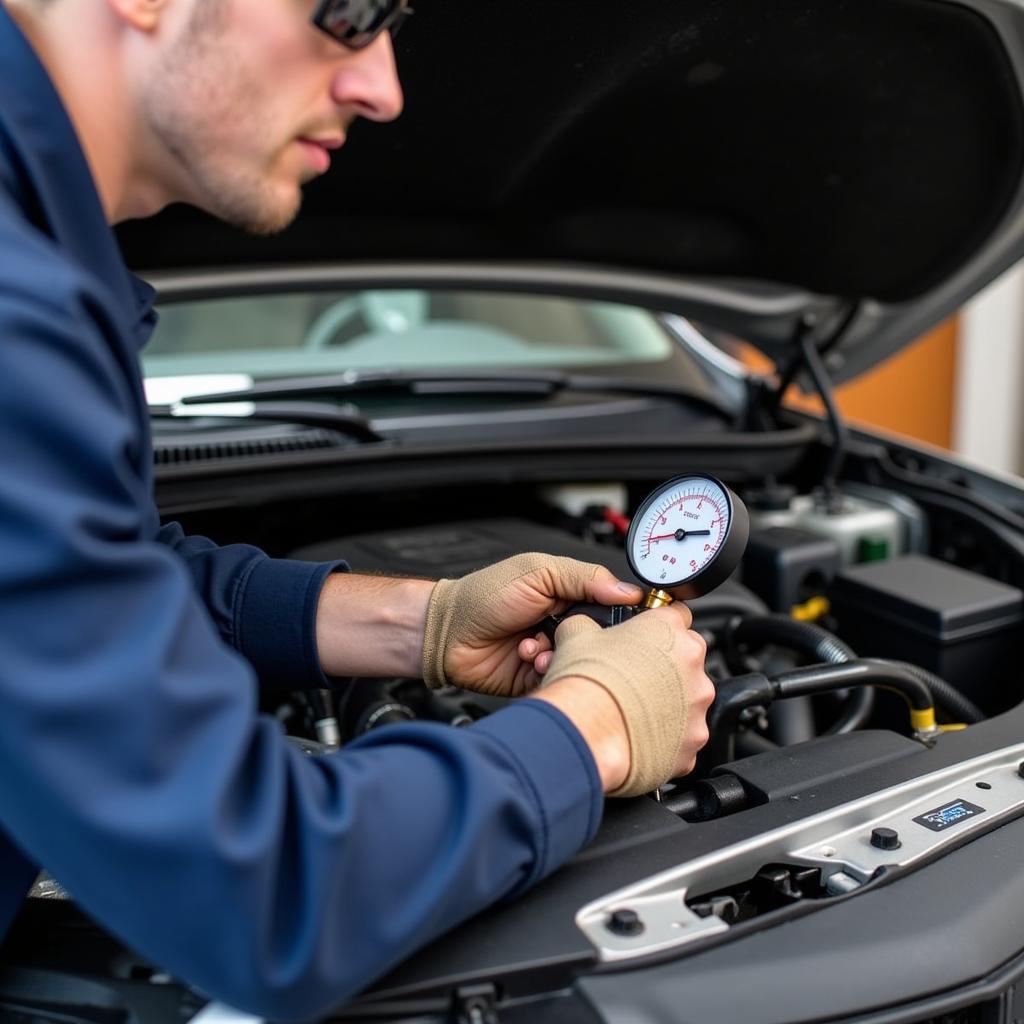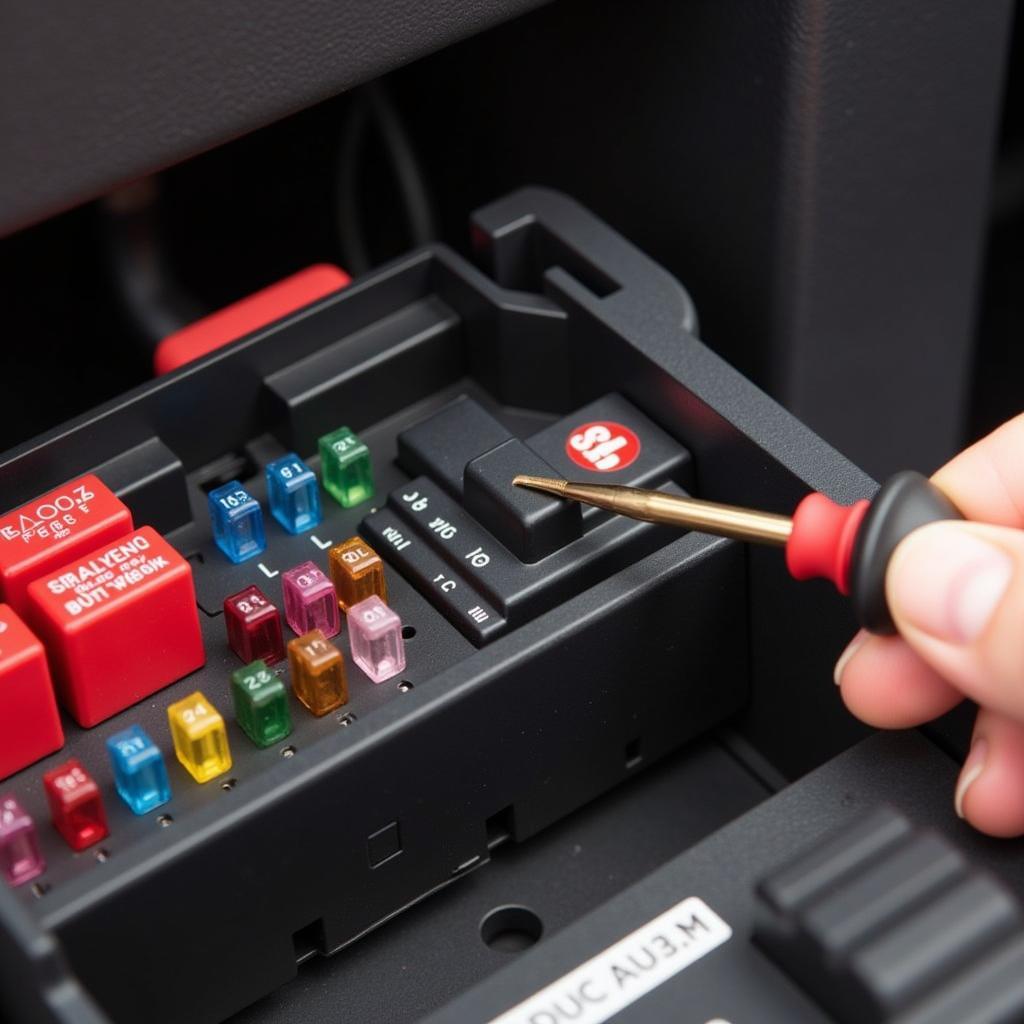A malfunctioning car AC can make driving unbearable, especially during hot weather. Knowing How To Fix The Air Conditioner In A Car can save you money and keep you comfortable. This guide will walk you through common AC problems, diagnostics, and solutions, empowering you to tackle the issue head-on.
If you are uncomfortable working on your car’s AC system, consider seeking professional help. You can find garages that specialize in car AC repair. garages that fix air conditioners in cars offer specialized services for all your AC needs.
Understanding Your Car’s AC System
Before diving into repairs, it’s crucial to understand the basic components of your car’s AC system. The system relies on refrigerant, typically R-134a or the newer R-1234yf, to cool the air. Key components include the compressor, condenser, evaporator, and expansion valve. These work together in a closed system to circulate and cool the refrigerant.
Common Car AC Problems and Solutions
Several issues can cause your car’s AC to malfunction. Let’s explore some of the most frequent problems and how to address them.
Low Refrigerant
One of the most common culprits is low refrigerant. If your AC isn’t blowing cold air, it might be due to a leak. Checking for leaks can be tricky, but you can sometimes spot oily residue around connections. Adding refrigerant without fixing the leak is a temporary solution.
You might be interested in learning how to fix leaking air conditioner car. Addressing the leak ensures long-term cooling efficiency.
 Checking Car AC Refrigerant Levels
Checking Car AC Refrigerant Levels
Faulty Compressor
The compressor is the heart of the AC system. If it’s not functioning correctly, the refrigerant won’t circulate. A seized compressor or a faulty clutch can prevent the system from cooling. Listening for unusual noises when the AC is on can help diagnose compressor issues.
Blocked Condenser
The condenser, located at the front of the car, releases heat absorbed by the refrigerant. A blocked condenser, often due to debris like leaves and dirt, restricts airflow and reduces cooling efficiency. Cleaning the condenser with a gentle stream of water or compressed air can improve performance.
Electrical Issues
Electrical problems, such as a blown fuse or a malfunctioning relay, can also disrupt the AC system. Check your car’s owner’s manual for the location of the AC-related fuses and relays. Replacing a blown fuse is a simple and inexpensive fix.
 Troubleshooting Car AC Electrical Problems
Troubleshooting Car AC Electrical Problems
Evaporator Problems
The evaporator, located inside the dashboard, absorbs heat from the cabin air. A leak in the evaporator can lead to low refrigerant and reduced cooling. Diagnosing and repairing evaporator issues can be more complex and might require professional assistance. If you’re looking for places that can fix leaking air conditioner car, online resources can help you locate nearby repair shops.
DIY AC Repair vs. Professional Help
While some AC problems can be addressed with DIY fixes, others require specialized tools and expertise. Knowing when to seek professional help is essential. If you’re unsure about the diagnosis or the repair process, it’s best to consult a qualified technician. You can find out where to get air conditioner in car fixed through online directories and recommendations.
“Regular maintenance is key to preventing AC problems,” advises John Smith, a seasoned automotive technician with over 20 years of experience. “Simple checks like inspecting the belts and hoses can prevent costly repairs down the line.”
Troubleshooting Tips for Your Car’s AC
- Check the Cabin Air Filter: A clogged cabin air filter can restrict airflow and reduce cooling efficiency.
- Listen for Unusual Noises: Strange sounds coming from the AC system can indicate a problem with the compressor or other components.
- Inspect the Belts and Hoses: Cracked or worn belts and hoses can lead to refrigerant leaks and other issues.
“Ignoring minor AC issues can lead to more significant problems,” cautions Sarah Jones, a certified automotive instructor. “Addressing problems early can save you money and frustration.”
Conclusion
Knowing how to fix the air conditioner in a car is valuable for any car owner. By understanding the system and following the troubleshooting steps outlined in this guide, you can tackle common AC problems and stay cool on the road. However, some issues require professional attention. If you experience unusual noises or suspect more complex problems like car rattles after air conditioner fixed, consult a qualified technician. For any further assistance or questions, feel free to contact AutoTipPro at +1 (641) 206-8880. Our office is located at 500 N St Mary’s St, San Antonio, TX 78205, United States.





Leave a Reply